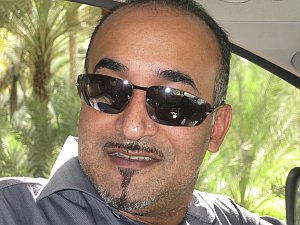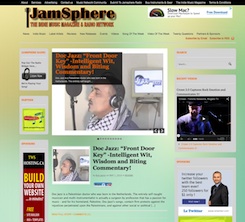Why you should listen to the music of Doc Jazz
 By Imane M. – translated from Dutch – Soon, on May 12th, Doc Jazz will come and perform his songs in Amsterdam. I don’t want to miss it, and you shouldn’t want to miss it either!
By Imane M. – translated from Dutch – Soon, on May 12th, Doc Jazz will come and perform his songs in Amsterdam. I don’t want to miss it, and you shouldn’t want to miss it either!
Maybe you are thinking: ‘Doc Jazz? Old-fashioned jazz music with all kinds of complex improvisations? Not for me!’
Well, I am a big fan of his music, while I usually never listen to jazz music. In fact, it isn’t really typical jazz, although it does have a “jazzy flavor”. It is beautiful music that is easy on the ears, and one of the things that makes it special is that all those songs put together tell a very clear story.
In an admirable way, Doc Jazz has given each song in his repertoire an important function. You could see it as information in a musical form, lovely music that makes this information very accessible. Subtly, almost every song contains many references to the issue it is about. Quite often, this issue is the Palestinian cause, and that is not to be wondered at since Doc Jazz is a Palestinian.
He also has songs about other subjects, and the more often I listen, the more I marvel at how he was able to weave so many things into his songs. Sometimes I only found out later that a certain phrase in the lyrics was a reference to a very specific event.
For example, I recently watched the documentary ‘Occupation 101’ about the Palestinian situation, and saw how Israeli soldiers were breaking the bones of Palestinian youths with rocks and sticks. All of a sudden I thought: so that ’s what Doc Jazz meant when he said ‘you better stop breaking our bones’, a phrase from the song ‘Intifada’.
I have also noticed how in his songs, the choruses have very simple messages, and are easy to sing along with, while the verses contain valuable background information. This structure makes this music very suitable for bringing people into contact with the Palestinian issue. I can barely think of a more elegant way of breaking the ice.
The song ‘Intifada’ that I mentioned before, provides a great example of this. The rap that’s in it is almost like a lecture about the Palestinian cause, it is actually that full of information. The beat of the song is crazily addictive, and when you hear the energizing Palestinian flute that he plays in it, you understand why this song has permanent value. It even contains references to Kosovo, the Native Americans and the Australian Aboriginals – examples of ethnic cleansing.
This song is highly recommended as an introduction to the music of Doc Jazz, even though its hip-hop style is not exactly representative of the majority of his repertoire. Doc Jazz, believe it or not, simply does all styles, from hip-hop to rock, funk, Arabic music and piano ballads. On top of that, he has played and recorded by far most of the instruments in the songs all by himself.
His new song ‘Right of Return’ is a real classic. Gorgeous music with beautiful saxophone solos by Susanne Alt, a treat for the ears. And again, that’s not all. The subject of the Right of Return is of the utmost importance to be the topic of a song. Doc Jazz provides a poetic and intellectual answer to Ben Gurion’s statement, who said in 1948 about the Palestinians: “the old will die, and the young will forget.” Not ! Doc Jazz says: “the old have died, but the young are strong”.
The diplomats of the ‘peace process’ also receive a well-deserved kick in the butt for their uselessness: “why don’t you just keep on talking while we walk the walk”. The symbolism in the song, like the olive tree and the key, beautifully portray the Palestinian spirit of resilience and resistance, and their ties to the land.
I’ll mention a few more songs. Doc Jazz has 98 songs online, so I could impossibly describe all of them here, even though they are really worth the trouble. The song ‘Undhor’ (“Look!”) is one of his Arabic songs. Even though I don’t understand every word of them, still I always find his Palestinian songs to be of extra value. This anti wall-song sounds so empowering that after listening to it, I always feel like going over and breaking down that disgusting wall myself!
The soft and moving song “Children of Gaza” always makes me very emotional. It’s really a song that makes you think. Despite its painful message, it still gives hope, not only to the listeners but also to the people in Gaza. Just wonderful.
Another impressive emotional song is the song he wrote in response to the gruesome murder of Marwa El Sherbiny in a German courtroom. You can simply hear that he wrote and sang this song with pain in his heart. I think it is awesome that he wrote a song about t his, since this crime barely made the news and therefore is relatively unknown. It’s also great that he says that it wasn’t just some tragedy, but a consequence of the hatred that is cultivated against Muslims by politicians in the West.
his, since this crime barely made the news and therefore is relatively unknown. It’s also great that he says that it wasn’t just some tragedy, but a consequence of the hatred that is cultivated against Muslims by politicians in the West.
Last but not least, the song ‘Home’, that he wrote in the memory of the mass murder in the Jenin refugee camp in 2002. By now, it has been ten years since it happened, and it was recently commemorated. You can really empathize with the girl he is singing about. Again, Doc Jazz succeeds in preserving a painful memory in a beautiful way, while still delivering an empowering and hopeful message. Despite everything, Palestinian refugees must keep the rightful heritage of their land in their hearts.
I’m sure you get the message: I believe you simply must listen to Doc Jazz, if the Palestinian cause means anything to you. There is only one Doc Jazz, and he is not easily replaced. And if you happen to live in the Netherlands or Belgium, and let the chance to listen to him performing these beautiful songs live on stage pass you by, then I can only tell you one thing: you are really missing out.




Recent Comments